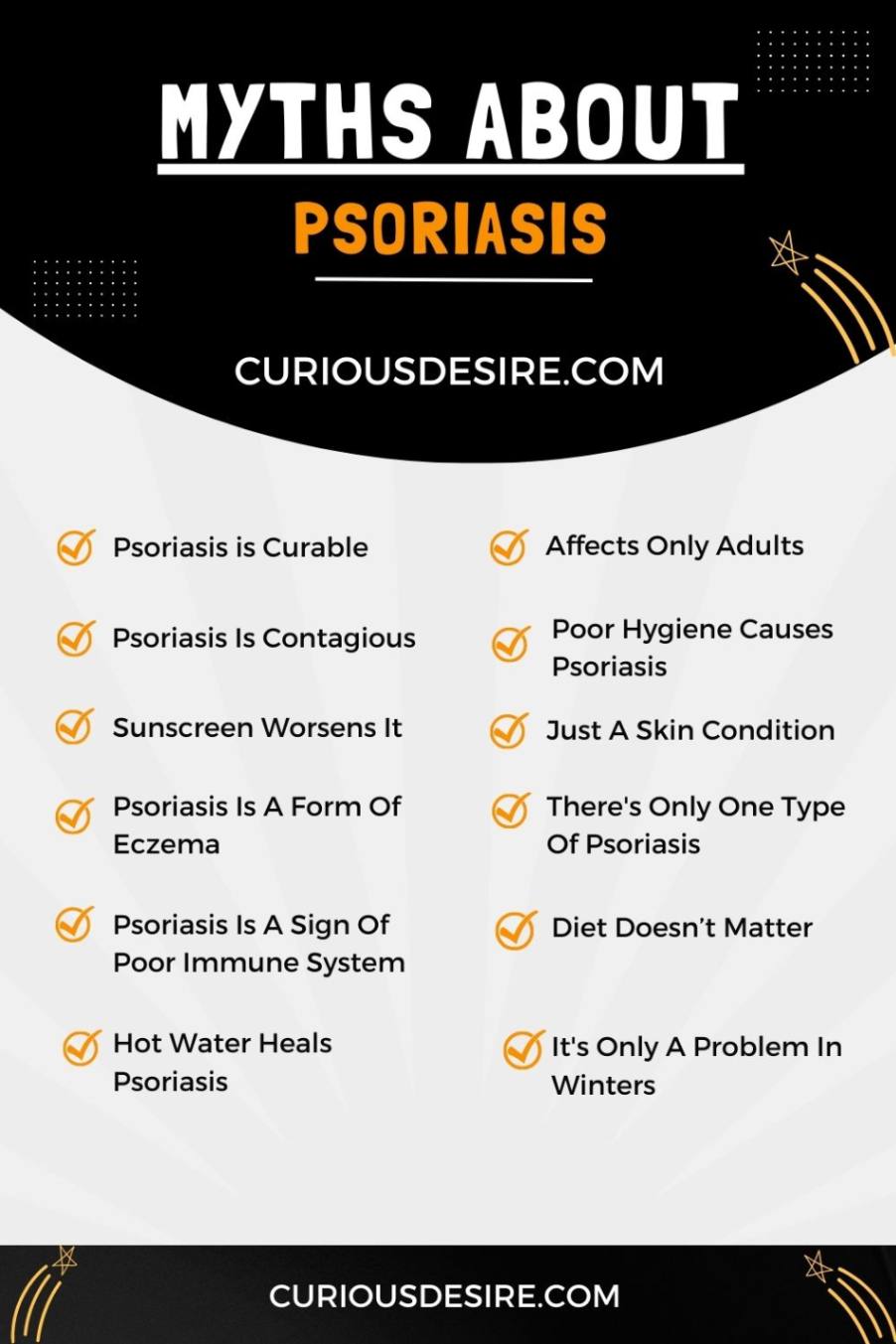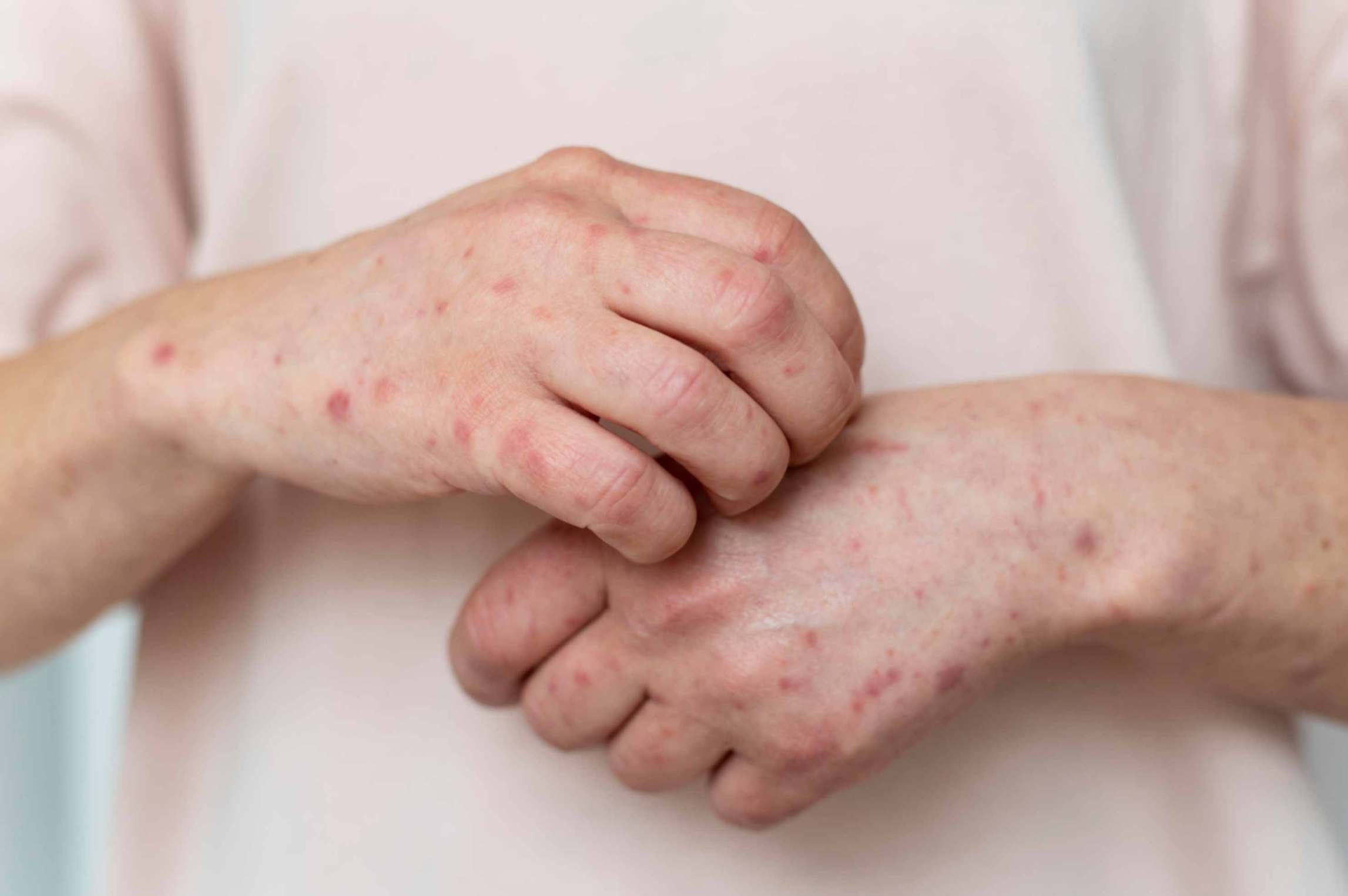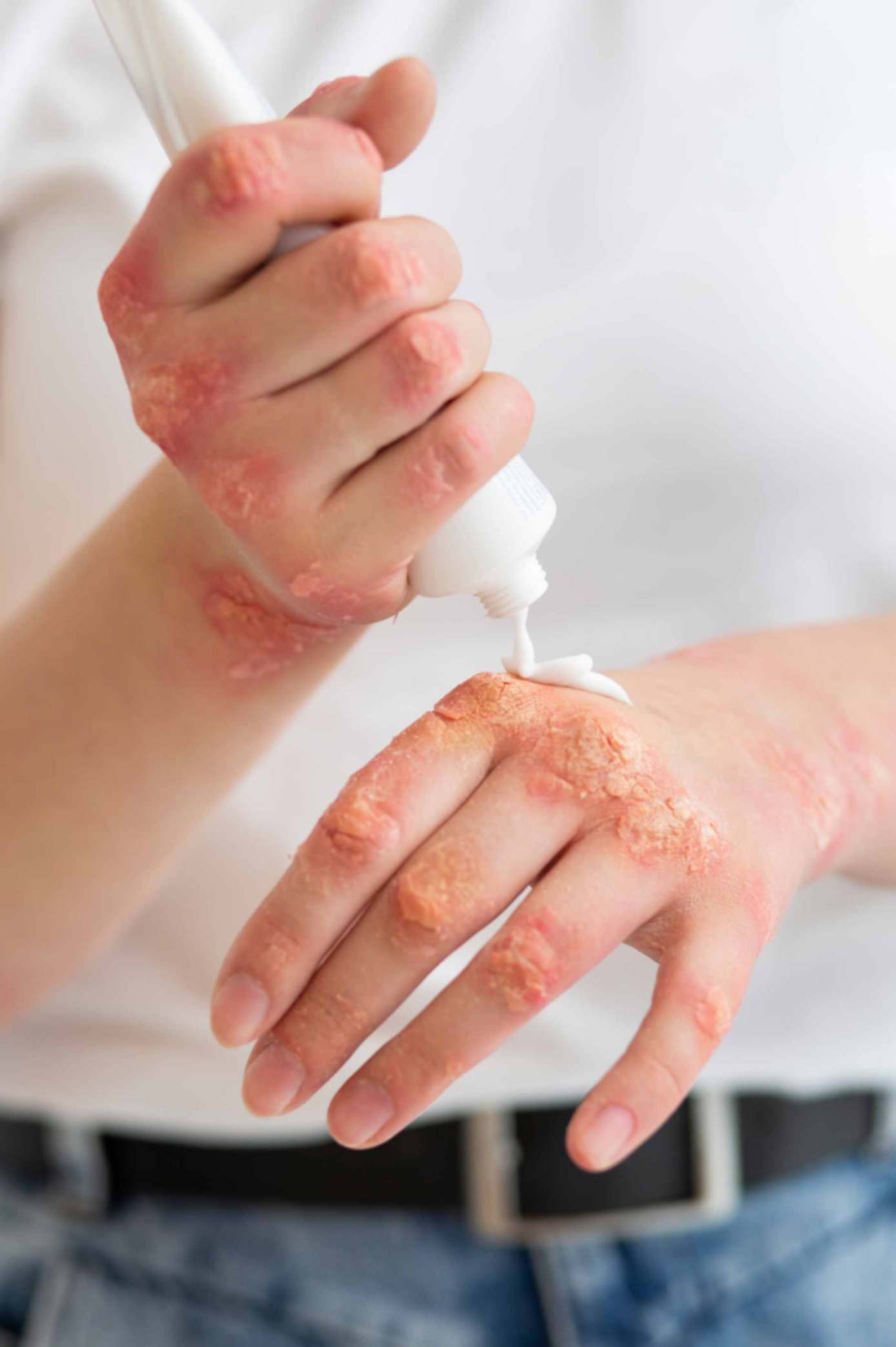Psoriasis, a chronic autoimmune condition affecting the skin, impacts around 125 million people globally. It is necessary to put myths about psoriasis to rest once and for all because the disease affects such a large number of people.
This blog will provide you with accurate information so you can better understand this often misunderstood condition.
5 Most Common Myths About Psoriasis
- Only adults get psoriasis.
- Psoriasis is caused by poor hygiene.
- Psoriasis is always itchy.
- Sunscreen worsens psoriasis.
- Psoriasis is contagious

Myth 1: Psoriasis Is Curable
Why This Myth Exists:
This myth arises due to a mistaken understanding of the true nature of psoriasis. We wrongly assume that psoriasis is a simple skin disorder that can be easily eliminated with the appropriate treatment, completely overlooking underlying causes, such as complex genetic and environmental factors.
Debunking The Myth:
Unfortunately, it is a reality that there is currently no known cure for psoriasis, but it is treatable.
The following things will help you manage this condition:
- Get some sun
- Take vitamin D
- Quit smoking
- Cut back on alcohol consumption
- Manage your stress level
- Eat healthy
Currently, available treatments for this disease are:
- Phototherapy
- Systematic Medications
- Biologic Therapies
Keep in mind, that none of the above-mentioned treatments completely cure psoriasis, they will only help you manage it.
It needs to be debunked, because of all the myths about psoriasis this one leads to unrealistic expectations and disappointment among those affected by the condition.
Myth 2: Only Adults Can Get Psoriasis
Why This Myth Exists:
The fact that Psoriasis is uncommon in children has given rise to this myth. However, it is not accurate to say that children do not get affected by this disease. Research suggests that approximately 20,000 children under the age of 10 and nearly 60,000 children between the ages of 10 and 19 are diagnosed with psoriasis.
The fact that symptoms of psoriasis are mild in children has also led to the prevalence of this myth.
Debunking The Myth:
Psoriasis can occur at any age. It is essential to understand that psoriasis does not discriminate based on age. The claim that only adults can get psoriasis lacks a scientific foundation. A recent study revealed that around one-third of all psoriasis cases begin in childhood.
The presentation of psoriasis in younger individuals may differ from that in adults. Children are more likely to develop a type of psoriasis known as “guttate psoriasis,” which is characterized by small, drop-like lesions scattered across the body. This can often be triggered by bacterial infections, such as throat infections, and it is particularly common in younger individuals.
Psoriasis can significantly affect a child’s quality of life, leading to physical discomfort, emotional distress, and social challenges. Stay Vigilant!
Myth 3: Psoriasis is Contagious
Why This Myth Exists:
This, one of the most prevalent myths about psoriasis, surely exists because of a lack of awareness and understanding. There should be an increase in public awareness about psoriasis through campaigns, and informational materials.
This can contribute to dispelling this myth and creating a compassionate environment for you and all those who are combating this disease.
Debunking The Myth:
Relax! Psoriasis doesn’t spread from one person to another. The reason is:
- It is not caused by bacteria, viruses, or any other infectious agents that can be transmitted from person to person.
- It is more of a genetic disease. If one parent has the condition, the child has a 10% chance of inheriting it. This likelihood increases to 50% if both parents have psoriasis.
You should interact with and support those with psoriasis without unwarranted concern.

Myth 4: Poor Hygiene Causes Psoriasis
Why This Myth Exists:
Poor hygiene does not directly cause psoriasis, but it can exacerbate your symptoms and trigger flare-ups.
Studies on psoriasis do not show a significant association between poor hygiene and the development of the condition. Instead, the medical community widely attributes the condition to genetics, immune system dysregulation, and environmental triggers.
Debunking The Myth:
Psoriasis is not a result of poor hygiene. While maintaining good personal hygiene is important for overall skin health, it is not the primary cause of psoriasis.
Psoriasis is caused by genetic and immune system factors. This immune dysregulation is fundamental to the development and progression of psoriasis and is unrelated to personal hygiene practices.
A study published in the Journal of Investigative Dermatology found that genetic factors contribute to approximately 81% of psoriasis cases.
Moreover, it is crucial to recognize that psoriasis can affect individuals regardless of their hygiene practices. People with meticulous hygiene routines as well as those with less stringent practices can develop psoriasis, emphasizing that the condition is not subjected to personal cleanliness.
Psoriasis is an equal-opportunity condition that can manifest in individuals from all walks of life, debunking the myth that it is linked exclusively to poor hygiene
Good hygiene practices are important for overall skin health and can help you manage your symptoms. Stay clean and hydrated.
Myth 5: Sunscreen Worsens Psoriasis
Why This Myth Exists:
Some people with psoriasis have reported that certain types of sunscreen irritate their skin. This is likely due to the specific ingredients contained in some sunscreens rather than the sunscreen as a whole.
However, with the wide variety of sunscreens available on the market, you can find one that is suitable for your sensitive skin. Do a thorough research before investing your money in a sunscreen.
Debunking The Myth:
According to the National Psoriasis Foundation, using sunscreen to protect the skin from sun exposure is an important part of managing psoriasis. We all know not all sunscreens are created equal.
Some sunscreens contain ingredients that may irritate sensitive skin, and for people with psoriasis, this may lead to a reaction. It is advisable to consult your dermatologist when it comes to managing psoriasis and choosing suitable sunscreen.
Some general tips on choosing sunblock suitable for people with psoriasis:
- Look for sunblock labeled as hypoallergenic, as they are less likely to irritate you.
- Fragrances can sometimes trigger skin reactions. Go for a sunblock that is fragrance-free to minimize the risk of irritation.
- Sunscreens with zinc oxide or titanium dioxide as active ingredients are often gentler on sensitive skin. These are known as physical or mineral sunscreens.
- Select a sunblock with at least SPF 30 for adequate protection.
Remember to perform a patch test before using a new sunblock to ensure it does not exacerbate your psoriasis symptoms. Additionally, reapply sunscreen regularly, for effective protection.
“Wear sunscreen 365 days a year”

Myth 6: It’s Just a Skin Condition and Not a Serious Health Issue
Why This Myth Exists:
Lack of awareness about psoriasis has led to the misconception that it is a minor skin condition, when in fact it is a significant health issue caused by an overactive immune system attacking healthy cells. It manifests as red, scaly patches but its effect goes beyond the skin.
Debunking The Myth:
Studies have connected psoriasis to a higher risk of developing cardiovascular diseases, diabetes, and other autoimmune disorders. Not only physical health, it has a profound effect on your emotional well-being as well.
Myth 7: Psoriasis Is a Form of Eczema
Why This Myth Exist:
The myth that a psoriasis is a form of eczema arises from the similarities in the symptoms and visual appearance of these two conditions. Both cause skin inflammation and irritation.
Debunking The Myth:
Psoriasis and eczema are distinct skin conditions with different causes, mechanisms, and treatments.
- Diverse Causes: Psoriasis is primarily caused by genetic factors and immune system dysfunction, while eczema is commonly associated with environmental factors, allergens, and irritants.
- Age of Onset: Eczema often manifests in childhood, and psoriasis tends to appear in adulthood, typically between the ages of 15 and 35.
- Different Treatments: Psoriasis management includes topical treatments, phototherapy, systemic medications, and biologic therapies. In contrast, eczema treatment primarily focuses on repairing the skin barrier through the use of moisturizers, and topical steroids.
Misidentifying psoriasis as a form of eczema can lead to inappropriate treatment strategies and delays in effective management. Therefore, raising awareness and educating the public about the distinctions between psoriasis and eczema can play a crucial role in this regard.
Myth 8: There Is Only One Type of Psoriasis
Why This Myth Exists:
The myth that there is only one type of psoriasis is quite common, and it might surprise most of you too, but there are several distinct types of psoriasis, each with its characteristics and symptoms.
Debunking The Myth:
There are various types of psoriasis:
- Plaque Psoriasis: Plaque psoriasis is the most common form of psoriasis. It accounts for about 80-90% of cases. It is characterized by raised, red patches.
- Erythrodermic Psoriasis: It is the least common form but is the most severe and can be life-threatening. It causes widespread redness, severe itching, and shedding of scales in sheets, which can lead to serious complications.
- Inverse Psoriasis: It forms in skin folds, such as the armpits, groin, and under the breasts, and appears as smooth, red lesions.
Source: 5MinuteSchool YT Channel
Myth 9: Psoriasis Is a Sign of a Poor Immune System
Why This Myth Exists:
The relationship between psoriasis and the immune system is complex and poorly understood. Having psoriasis does not necessarily mean that a person has a weak or poor immune system.
In fact, in many cases, the immune system of people with psoriasis is overactive rather than weak.
Debunking The Myth:
The immune system in people with psoriasis is not weak; rather, it is hyperactive. Instead of protecting the body, the immune system targets healthy skin cells, leading to the characteristic symptoms of psoriasis.
Additionally, there is no evidence to suggest that people with psoriasis are more prone to infections or other illnesses due to a weak immune system. The overactive immune response associated with psoriasis may provide some level of protection against certain types of infections.
Myth 10: Diet Has No Impact on Psoriasis
Why This Myth Exists:
This is one of the most common myths about psoriasis that has circulated for many years. However, clinical evidence suggests otherwise, indicating that diet can indeed play a significant role in the management of psoriasis symptoms.
Debunking The Myth:
Some foods and specific nutrients may have a protective or therapeutic effect on individuals with psoriasis.
The Mediterranean diet, for instance, which is high in fruits, vegetables, whole grains, and healthy fats like olive oil, contributes to lowering the risks of developing psoriasis.
One study published in JAMA Dermatology in 2018 found that a higher intake of fruits, vegetables, and lean proteins was associated with a lower risk of developing psoriasis, while a diet high in sugary beverages and red and processed meats was linked to an increased risk.
Myth 11: Hot Water Heals Psoriasis
Why This Myth Exists:
Psoriasis is a complex autoimmune disorder that causes skin cells to multiply up to 10 times faster than normal, resulting in raised, red, and scaly patches.
The myth that hot water can heal psoriasis likely stems from a misunderstanding of the condition and its treatments. However, it’s essential to debunk this myth and provide accurate information about managing psoriasis effectively.
Debunking The Myth:
Using hot water can worsen your symptoms and lead to further discomfort. When the skin comes into contact with hot water, it can cause increased inflammation and irritation, which may worsen psoriatic plaques.
Myth 12: Psoriasis is Only a Winter Problem
Why This Myth Exists:
This is the most prevalent of all myths about psoriasis. arises from the observation that some people experience severity in the symptoms of psoriasis during the winter season. In winter, the temperature is cold and humidity levels are lower which leads to dry skin.
Debunking The Myth:
Psoriasis is not confined to any particular season. It is a year-round condition influenced by myriad factors.
Psoriasis occurs when the immune system mistakenly attacks healthy skin cells, leading to the rapid formation of red, scaly patches on the skin. This autoimmune process is ongoing, irrespective of the season.
Conclusion
Remember, psoriasis is not contagious, and it’s not simply a cosmetic issue. It’s a chronic autoimmune disease that deserves empathy and understanding. Let’s strive to spread awareness, promote acceptance, and support ongoing research to improve the lives of those living with psoriasis.
Together, we can debunk myths, shatter stigmas, and build a more compassionate society.
Psoriasis Myths FAQs
1. What is psoriasis?
Psoriasis is a chronic autoimmune condition that causes the rapid overgrowth of skin cells, leading to the formation of thick, silvery scales and itchy, dry, and red patches on the skin.
2. What are the common symptoms of psoriasis?
The most common symptoms of psoriasis include red, inflamed patches of skin, thickened, pitted, or ridged nails, dry, cracked skin that may bleed, and plaques covered in silvery scales.
3. Is psoriasis contagious?
No, psoriasis is not contagious. It is caused by an overactive immune system and is not spread through physical contact or other means. “Psoriasis is Contagious” is one of the most prevalent myths about psoriasis.
4. What are the treatment options for psoriasis?
Treatment options for psoriasis include topical creams, phototherapy, oral medications, biologic drugs, and lifestyle modifications such as stress reduction and avoiding triggers.
5. How does psoriasis impact mental health?
Psoriasis can have a significant impact on mental health, leading to feelings of embarrassment, depression, anxiety, and lowered self-esteem due to the visibility and chronic nature of the condition.
6. Does psoriasis influence the body’s ability to metabolize certain foods?
Psoriasis does not have a direct impact on the body’s ability to metabolize foods. However, a balanced and healthy diet is important for overall well-being.
7. What is the relationship between psoriasis and depression?
Psoriasis can be associated with a higher risk of depression and anxiety. Individuals with psoriasis need to prioritize mental health and seek support when needed.
8. Can psoriasis be treated in children?
Yes, psoriasis can occur in children, and treatment options are available. Still, they may differ from those used in adults, depending on the child’s age and the severity of the condition.